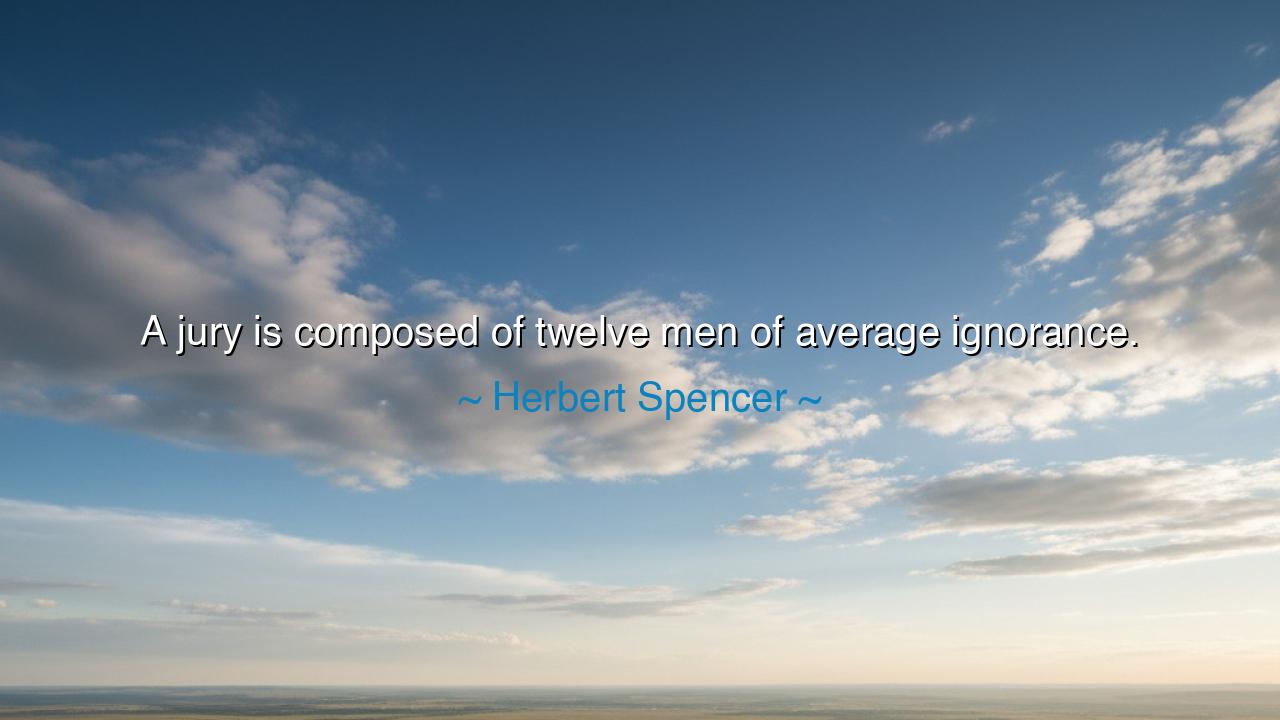
A jury is composed of twelve men of average ignorance.






Hear the sharp words of Herbert Spencer, philosopher of human society: “A jury is composed of twelve men of average ignorance.” At once these words sting and provoke, for they strip away the noble mask of justice to reveal the frailty beneath. Spencer, ever skeptical of institutions, saw that the fate of men and women is often entrusted not to sages or scholars, but to ordinary citizens—flawed, biased, and limited in understanding. His saying is not a dismissal of democracy, but a sober reminder that justice itself is shaped by the minds of the common multitude.
The meaning of his words lies in the paradox of the jury. On one hand, it is a symbol of fairness, ensuring that no single judge or ruler decides the fate of an accused. On the other hand, it is also a gathering of individuals who may lack knowledge of the law, science, or subtlety of truth. These “twelve men of average ignorance” are charged with sifting through complex arguments, weighing the testimony of experts, and discerning guilt or innocence. They represent society itself—fallible, emotional, swayed by eloquence, sometimes blind to nuance.
History has shown both the nobility and the peril of this system. Consider the trial of Socrates in ancient Athens. He was judged not by wise philosophers, but by a jury of citizens, who, swayed by suspicion and prejudice, condemned him to death for corrupting the youth and impiety. Here we see Spencer’s point made flesh: the fate of one of history’s greatest minds was decided by men of “average ignorance,” and in their hands, justice faltered. The verdict became a stain upon Athens, remembered long after the jurors themselves were forgotten.
Yet there is also a strange strength in this weakness. For the jury, even in its ignorance, represents the voice of the people. It prevents the law from becoming the tool of kings alone, balancing power with the judgment of the many. Its flaws mirror the flaws of humanity, but so too does its fairness mirror the fairness of shared responsibility. Spencer’s words do not wholly condemn, but they warn: if we entrust justice to the ignorant, we must also strive to uplift them with wisdom, lest their verdicts bring ruin rather than righteousness.
The deeper lesson here is that ignorance is not confined to juries alone. All human institutions are composed of imperfect beings, whose judgments are clouded by bias, fear, or lack of knowledge. The wise, therefore, should not mock the failings of the jury but seek to remedy them: by spreading knowledge, by demanding integrity in courts, and by ensuring that truth is made clear even to the unlearned. For justice does not require perfection, but it does require clarity and honesty.
Consider the case of the Scottsboro Boys in 1931, nine young Black men falsely accused in Alabama. Their juries, composed of “average ignorance,” were blinded by racial prejudice, convicting the innocent despite weak and conflicting evidence. Only decades later was justice restored in memory. Here again, Spencer’s warning reveals itself: ignorance, when left unchecked, turns the jury from instrument of fairness into weapon of oppression.
The lesson for us is plain: guard against ignorance. If you are called to judge, seek truth with humility, not pride. Educate yourself, so that your voice may not be easily swayed by rhetoric or prejudice. And as a society, invest in the enlightenment of all, for only when the people are wise can their juries render justice worthy of the name. The duty of knowledge is not for scholars alone, but for every citizen who may one day hold another’s fate in their hands.
So remember Spencer’s words: “A jury is composed of twelve men of average ignorance.” Let them stir you not to despair, but to vigilance. For the strength of justice lies not in perfection, but in the pursuit of truth even among the imperfect. If we choose knowledge over blindness, wisdom over prejudice, and fairness over fear, then even a jury of the “ignorant” may yet become a vessel of justice, and the law a light to future generations.






AAdministratorAdministrator
Welcome, honored guests. Please leave a comment, we will respond soon